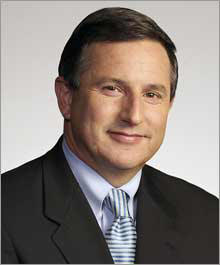This page has been validated HTML 4.01 Transitional by W3C.org
Hewlett Packard's Shareholders Vote on Power to Nominate Directors
March 15, 2007. At the annual shareholders meeting in Santa Clara, California, HP's shareholders voted on a shareholder initiative titled Proposition 3. The results of the vote had been keenly awaited in boardrooms across the United States and Canada, if not elsewhere around the world.
The proposition would have dramatically changed the way HP presently nominates board members. Instead of a board nomination committee having sole discretion in nominating directors for election, the proposition would have given shareholders who have owned at least three percent of HP shares for at least two years, the option to nominate up to two candidates for election to the board.
Proposition 3 was supported by the New York State Common Retirement Fund, the Connecticut Retirement Plans and Trust Funds, the North Carolina Equity Investment Fund, the California State Teachers' Retirement System and the California pension fund Calpers. Said Russell Read, chief investment officer of Calpers:
"The best reflection of what we are looking to get is shareholder democracy. We are not looking for rubber stamping, we are looking for effective representation. We think without having effective access to the proxies, there can be a danger of board members becoming insular and not reflective of the interest of the shareowners. Some of the history of HP certainly shows that."
As expected, initiatives such as this do not receive executive support. They dramatically reduce a CEO's influence on the board. Perhaps their excessive compensation demands will come under close scrutiny.  HP's Chairman and CEO Mark Hurd is no exception. He did not support the initiative and lobbied against the proposition. Hurd contended that changing the way the board members were nominated risked "the election of special interest directors" and "divisive and expensive proxy contests."
HP's Chairman and CEO Mark Hurd is no exception. He did not support the initiative and lobbied against the proposition. Hurd contended that changing the way the board members were nominated risked "the election of special interest directors" and "divisive and expensive proxy contests."
Anti-democratic proponents usually feel that an electorate does not have the wisdom to make correct choices and that the electorate must be protected from their ignorance for their own good.
The proposition required a two-third majority in order to pass. It received 39% of the vote. While the initiative was defeated, the move for greater shareholder power and democracy is well under way.
Full Story on the HP's Governance Problems
Hewlett Packard's Corporate Governance Pages On This Site
HP's Governance Woes
» 1. The Origins of Hewlett Packard Governance Problems - The Carly Fiorina's Years
» 2. Hewlett Packard Governance Problems Escalate - Patricia Dunn's Focus as Chairwoman
» 3. Pretexting and Other Orwellian Monitoring Tactics
» 4. The Disintegration of HP's Board
» 6. Civil Charges Against HP and Insider Trading Charges Against Mark Hurd
